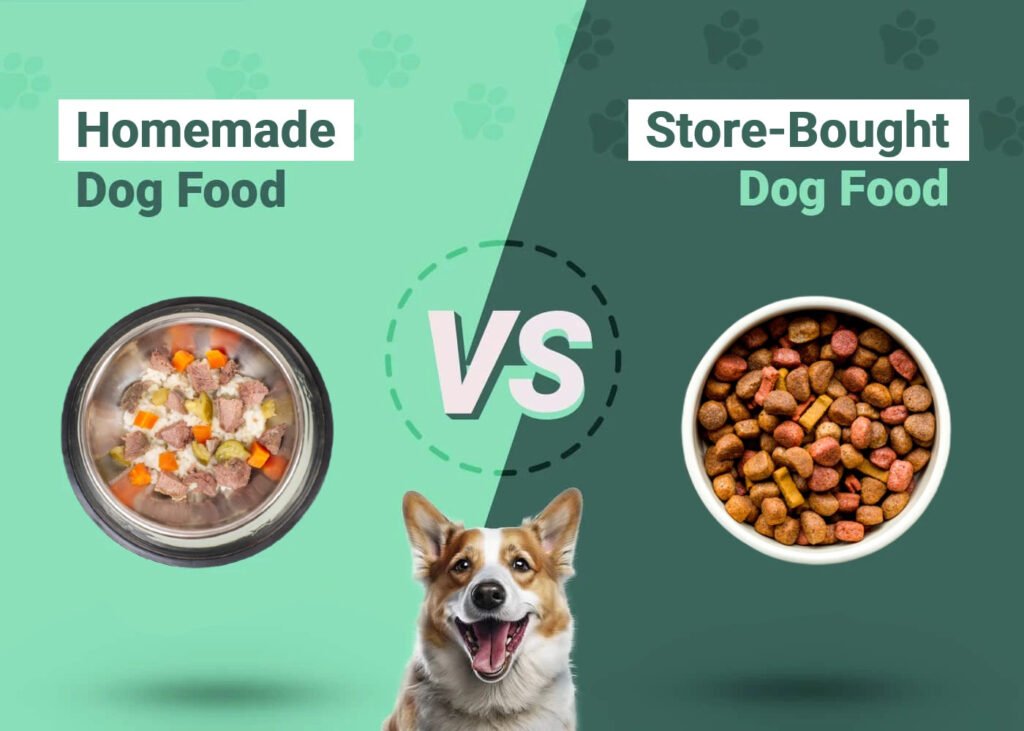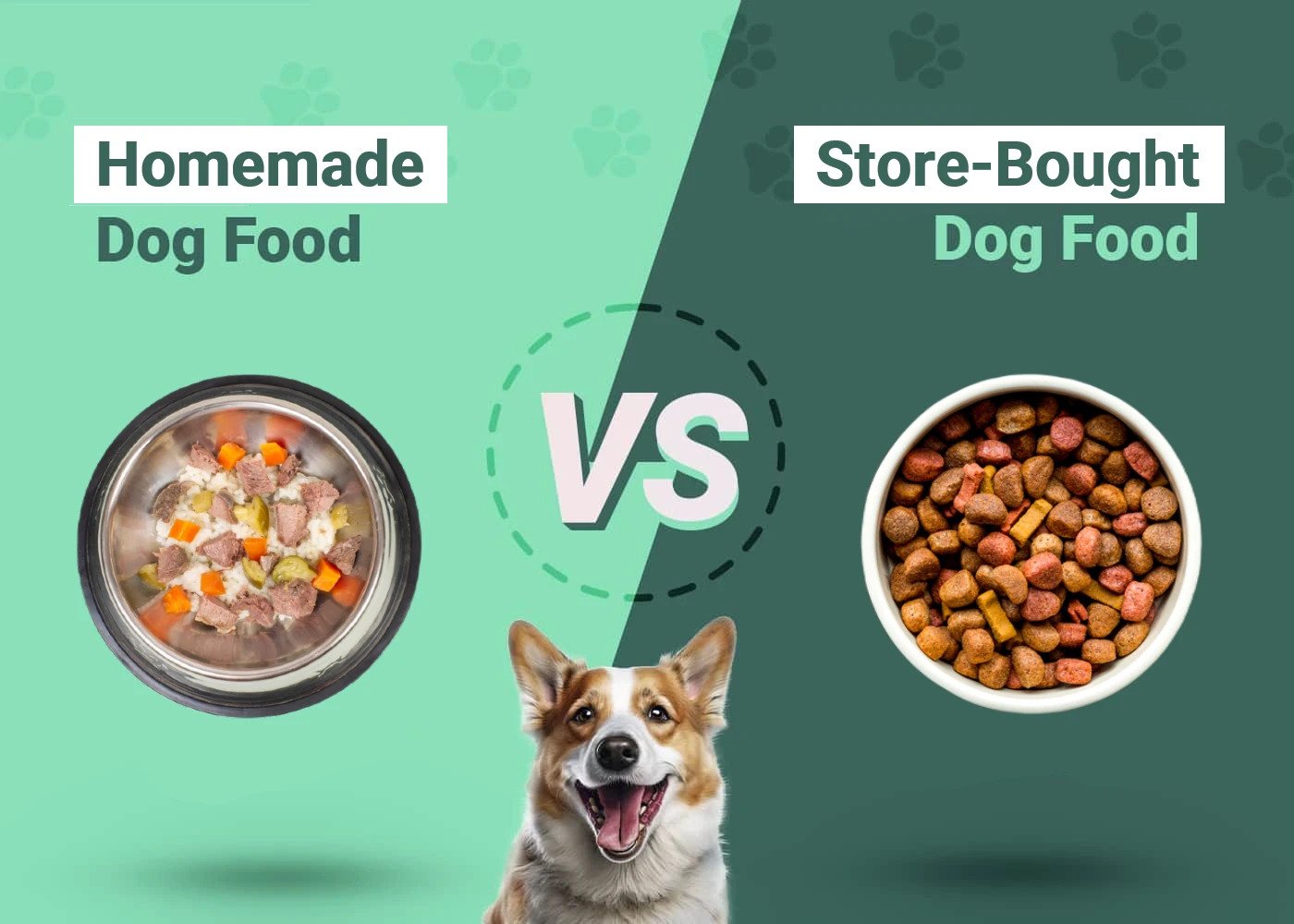The Great Dog Food Dilemma: Homemade or Store-Bought? Let’s Settle It!
Pet owners frequently have to make the difficult choice of whether to manufacture their own dog food or continue using store-bought varieties in order to provide their furry buddy the greatest nutrition possible. You can choose the option that best fits your dog’s needs, lifestyle, and health by being aware of the advantages and disadvantages of each.
We’ll examine the differences between homemade and store-bought dog food in detail in this extensive guide. We’ll compare the benefits and drawbacks of each, point out important nutritional aspects, and even recommend a few affiliate goods that can make making your own dog food easier or enhance store-bought alternatives.

1. Introduction to Dog Nutrition
Understanding the fundamentals of canine nutrition is crucial before delving into the argument between store-bought and homemade dog food recipes. Like people, dogs require a diet that is well-balanced that contains proteins, fats, carbohydrates, vitamins, and minerals. Age, breed, exercise level, and any particular health issues should all be taken into consideration while choosing their food.
In order to have more control over what their dogs consume, many pet owners are looking into homemade dog food recipes, even though store-bought dog foods are designed to satisfy these nutritional requirements. Is one choice better than the other, though?
2. Homemade Dog Food: The Benefits
2.1 Full Control Over Ingredients
One of the primary advantages of making homemade dog food is the control you have over the ingredients. You can select high-quality meats, fresh vegetables, and whole grains, ensuring your pet’s food is free from preservatives, artificial flavors, and fillers commonly found in some commercial dog foods.
2.2 Customizable Diet
If your dog has specific dietary needs or allergies, homemade food allows you to customize their meals. You can adjust the protein, fat, and carbohydrate ratios according to your dog’s requirements. For instance, older dogs may benefit from diets lower in fat but higher in fiber, while active dogs might need more protein and fats for energy.
2.3 Freshness and Quality
With homemade dog food, you’re always sure of the freshness and quality of the ingredients. Freshly prepared meals can be healthier and more appetizing for dogs compared to dry kibble that sits on shelves for months.
2.4 No Preservatives or Artificial Additives
Many commercial dog foods contain preservatives to extend shelf life. Homemade recipes are free from these additives, which could be better for your dog’s long-term health.
2.5 Improved Digestibility
Homemade dog food can be easier to digest, especially for dogs with sensitive stomachs. Fresh, whole ingredients tend to be gentler on the digestive system than highly processed commercial options.
3. The Drawbacks of Homemade Dog Food
3.1 Time-Consuming Preparation
Making homemade dog food can be time-consuming. It requires planning, shopping, and cooking. For busy pet owners, this may not be feasible on a regular basis.
3.2 Nutritional Imbalance
Creating a balanced homemade diet is challenging. Without the right knowledge or guidance, homemade diets may lack essential nutrients, leading to deficiencies. Dogs need precise levels of vitamins, minerals, and nutrients that are often easier to find in commercial foods.
3.3 Higher Costs
Homemade dog food can be more expensive than store-bought options, especially if you’re using premium-quality ingredients. This may not be a sustainable option for pet owners on a budget.
3.4 Shorter Shelf Life
Homemade dog food lacks preservatives, which means it has a shorter shelf life. You’ll need to prepare fresh batches frequently or freeze portions, which requires additional storage space.
4. Store-Bought Dog Food: The Benefits
4.1 Convenience and Time-Saving
The most significant advantage of store-bought dog food is convenience. It’s readily available, easy to store, and doesn’t require preparation time. For busy pet owners, commercial dog food is a hassle-free solution.
4.2 Nutritionally Balanced
High-quality commercial dog foods are formulated by experts to ensure they meet all of your dog’s nutritional needs. They often contain a balanced mix of proteins, fats, carbohydrates, vitamins, and minerals, which can be challenging to replicate with homemade food.
4.3 Wide Range of Options
The market is filled with various dog food brands, each catering to different dietary needs. Whether your dog requires grain-free, high-protein, or low-fat options, there’s a commercial product available to suit them.
4.4 Cost-Effective
Store-bought dog food can be more budget-friendly, especially when buying in bulk. There are plenty of affordable yet nutritious options available that won’t break the bank.
5. The Drawbacks of Store-Bought Dog Food
5.1 Presence of Fillers and Additives
Some commercial dog foods contain fillers like corn, wheat, or soy, which can be difficult for some dogs to digest. Additionally, artificial preservatives and flavors can potentially cause health issues over time.
5.2 Risk of Recalls
There have been cases where commercial dog food brands have been recalled due to contamination or harmful ingredients. This can be concerning for pet owners who want to ensure the safety of their pets.
5.3 Lower Quality Ingredients
Not all commercial dog foods are created equal. Some use lower-quality ingredients, including meat by-products, which may not provide the same level of nutrition as fresh, whole foods.
6. Nutritional Comparison: Homemade vs. Store-Bought
When comparing the nutritional value of homemade dog food recipes with store-bought options, several factors come into play:
Nutrient | Homemade Dog Food | Store-Bought Dog Food |
Protein | Customizable, fresh protein sources | Pre-measured, often meat by-products |
Carbohydrates | Fresh grains or vegetables | Can include fillers like com |
Fats | Healthy oils like fish or olive oil | Animal fats, sometimes of lower quality |
Vitamins & Minerals | Needs supplementation | Often fortified |
Additives | None | Preservatives, artificial flavors |
Both homemade dog food and store-bought options have their own set of advantages and challenges. The best choice for your pet depends on factors such as their health needs, your lifestyle, and your budget. If you have the time and resources, homemade dog food can be a rewarding way to provide a nutritious diet tailored to your pet’s needs. On the other hand, store-bought dog food offers convenience and a variety of options.

